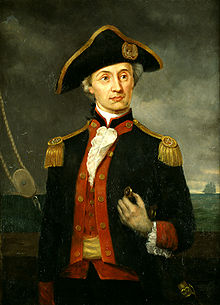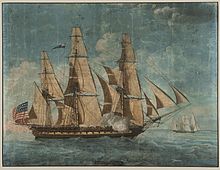John Paul Jones
Jump to navigation
Jump to search

John Paul Jones (6 July 1747 – 18 July 1792) was a Scottish American sailor and the United States' first well-known naval fighter in the American Revolutionary War. Although he made many friends and enemies among America's political elites, his actions in British waters during the Revolution earned him an international reputation which persists to this day. As such, he is sometimes referred to as the "Father of the American Navy" (an epithet he shares with John Barry). He later served in the Imperial Russian Navy, subsequently obtaining the rank of rear admiral.
Quotes[edit]



- A navy is essentially and necessarily aristocratic. True as may be the political principles for which we are now contending they can never be practically applied or even admitted on board ship, out of port, or off soundings. This may seem a hardship, but it is nevertheless the simplest of truths. Whilst the ships sent forth by the Congress may and must fight for the principles of human rights and republican freedom, the ships themselves must be ruled and commanded at sea under a system of absolute despotism.
- Letter to the Naval Committee of Congress (14 September 1775)
- I wish to have no connection with any ship that does not sail fast; for I intend to go in harm's way.
- Letter to Le Ray de Chaumont (16 November 1778), as quoted in The Naval History of the United States (1890) by Willis John Abbot, p. 82
- I have not yet begun to fight!
- His famous response, in the early phase of the Battle of Flamborough Head, (23 September 1779) to an inquiry by his opponent (Captain Richard Pearson of the Royal Navy ship HMS Serapis) as to whether he was surrendering his ship, the USS Bonhomme Richard, as recounted in the reminiscences of Jones's First Lieutenant, Richard Dale, as published in The Life and Character of John Paul Jones, a Captain in the United States Navy (1825) by John Henry Sherburne:
- ...the Bon Homme Richard, having head way, ran her bows into the stern of the Serapis. We had remained in this situation but a few minutes when we were again hailed by the Serapis, "Has your ship struck?" To which Captain Jones answered, "I have not yet begun to fight!"
- In Naval teminology to "strike the colours" means to haul down the ship's flag to signify surrender, but here the use of the ship as subject of the sentence may imply a pun on the non-naval use of "struck".
- I may sink, but I'll be damned if I strike!
- His much less famous response, in the late phase of the Battle of Flamborough Head, 23 September 1779, to an inquiry by his opponent (Captain Richard Pearson of the Royal Navy ship HMS Serapis) as to whether he was surrendering his ship, the USS Bonhomme Richard, which was by this time very seriously damaged.
- This was what some of his sailors, reported in British newspapers at the time, claimed he had said; Jones's official report merely stated that he had answered "in the most determined negative".
- Where men of fine feeling are concerned there is seldom misunderstanding.
- Letter from Jones to the Marquis de Lafayette, (1 May 1779)
Misattributed[edit]
- That flag and I are twins, born in the same hour from the same womb of destiny. We cannot be parted in life or in death.
- This statement was attributed to Jones in a 1900 biography by Augustus C. Buell which contains much material now believed to have been fabricated by Buell.
- Variant: That flag and I are twins. We were born at the same hour. We cannot be parted in life or death. So long as we float, we shall float together.
- It is by no means enough that an officer of the Navy should be a capable mariner. He must be that, of course, but also a great deal more. He should be as well a gentleman of liberal education, refined manners, punctilious courtesy, and the nicest sense of personal honor.
He should be the soul of tact, patience, justice, firmness, kindness, and charity. No meritorious act of a subordinate should escape his attention or be left to pass without its reward, even if the reward is only a word of approval. Conversely, he should not be blind to a single fault in any subordinate, though at the same time, he should be quick and unfailing to distinguish error from malice, thoughtlessness from incompetency, and well meant shortcomings from heedless or stupid blunder.
In one word, every commander should keep constantly before him the great truth, that to be well obeyed, he must be perfectly esteemed.- Statement long attributed to Jones, but now believed to have been written by Augustus C. Buell; Reef Points: 2003-2004, 98th Edition, U.S. Naval Academy (2003)
Quotes about Jones[edit]
- The future naval officers, who live within these walls, will find in the career of the man whose life we this day celebrate, not merely a subject for admiration and respect, but an object lesson to be taken into their innermost hearts. . . . Every officer . . . should feel in each fiber of his being an eager desire to emulate the energy, the professional capacity, the indomitable determination and dauntless scorn of death which marked John Paul Jones above all his fellows.
- U.S. President Theodore Roosevelt, in an address to the U.S. Naval Academy, Annapolis (24 April 1906)
- The boy born at Arbigland in Scotland on 6 July 1747 and christened John, who later added Jones to his surname Paul, and who was generally known as Paul Jones during the height of his naval career, had a complex character and far from a simple career. Born in obscurity and poverty, he rose through his own efforts to be a distinguished naval officer and a prominent figure at the Court of Versailles. He professed to have fallen in love with America at first sight, and declared undying allegiance to the new nation; but the last five years of his life were spent in Europe. On many occasions he wrote that he had drawn his sword from pure love of liberty and as a "citizen of the world"; but he drew it for the last time in the service of the greatest despot in Europe, Imperial Catherine. He affected contempt for family and rank; but he longed to be accepted by the county families of Scotland, and his happiest years were spent in Paris under the shadow of royalty as le Chevalier Paul Jones. He professed to be indifferent to wealth; but no naval officer strove longer and more strenuously than he to exact the last penny due to him and his men for prize money. He could be tougher and rougher than the most apelike sailor on his ships; yet, when entertaining ladies on board or ashore, his manners were those of a very fastidious gentleman. He pretended total indifference to fame, but he took every possible means to place a far from modest estimate of himself before the public of two continents. And well did he succeed in this effort. Today, for every one who has heard of his fellow captains of the young Continental Navy, such as Manley, Wickes, Barry and Biddle, thousands have heard of John Paul Jones.
- Samuel Eliot Morison, John Paul Jones: A Sailor's Biography (1959), p. 3-4
- Yet, first and always, Paul Jones was a fighting sailor. In the history of the United States Navy, whose rise to be the greatest navy in the world he desired and foretold, Paul Jones now occupies a place comparable only with that of Nelson in the Royal Navy of Great Britain. And, although he never had Nelson's opportunities for fame, I have no doubt that, given them, he would have proved himself to be a great naval tactician and strategist. In the board-to-board, hand-to-hand sea fights in which he did engage, he was without peer.
- Samuel Eliot Morison, John Paul Jones: A Sailor's Biography (1959), p. 4
- Thus, although Jones had it in him to be a great naval strategist, he found opportunity to prove himself only on the tactical level. There he was magnificent. Recall how he made prompt and sure decisions in emergencies, perfectly adapting his tactics to suddenly confronted facts, as in those first audacious cruises in Providence and Alfred and in the battles of Ranger vs. Drake, Bonhomme Richard vs. Serapis, and Ariel vs. Triumph. That sort of thing is the sure mark of a master in warfare. Of the quality of his seamanship, one needs no more evidence than those early escapes from faster and more powerful ships, and the saving of Ariel from crashing on the Penmarch rocks. His battle with Serapis, as an example of how a man through sheer guts, refusing to admit the possibility of defeat, can emerge victorious from the most desperate circumstances, is an inspiration to every sailor. To every sailor, I say, not only to Americans. In one of his letters of 1780, Jones wrote, "The English Nation may hate me, but I will force them to esteem me too." This prophecy was fulfilled over a century and a half later, when the Right Honourable Albert Alexander, First Lord of the Admiralty, in a broadcast beamed to America, declared that Paul Jones' defiant answer to Pearson expressed exactly what England felt in the dark days of the Battle for Britain. And in the six months of tribulation for the United States that followed the Japanese strike on Pearl Harbor, the one sentiment in the back of every American sailor's mind was that of John Paul Jones: I HAVE NOT YET BEGUN TO FIGHT
- Samuel Eliot Morison, John Paul Jones: A Sailor's Biography (1959), p. 412-413

